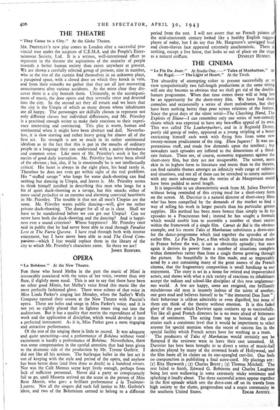THE CINEMA
" Le Fin Du Jour." At Studio One. "Tales of Manhattan." At the Regal.--" The Light of Heart." At the Tivoli.
THE absurdity of attempting either to present successfully or to view sympathetically two full-length productions at the same sitting will one day become so obvious that we shall get rid of the double- feature programme. When that time comes there will at long last be an opportunity for the short-story film. We have had short comedies and occasionally a series of short melodramas, but they have been nothing better than poor screen relations of the feature. Since the great days of the silent serial—The Clutching Hand, The Exploits of Elaine—I can remember only one series of non-comedy shorts which was expected to have any box-office appeal of its own. This was called The Leatherpushers, and in it Reginald Denny. portly old gossip of today, appeared as a young stripling of a boxer extricating himself each week with flying fists from some new twenty-minute predicament of the ring. Eheu fugaces! It was un- pretentious stuff, and made few demands upon the intellect ; but nowadays such episodes are inflated to the dimensions of a third- rate feature. There are, of course, economic arguments against the short-story film, but they are not insuperable. The screen, more akin in its highest form to literature and music than to the theatre, can find suitable themes amongst an infinitely wide range of subjects and situations, and not all of them can be stretched to ninety minutes with any more advantage than the stories of de Maupassant could have been padded to novel length.
It is impossible to see characteristic work from M. Julien Duvivier without being reminded of this crying need for a short-story form on the screen. M. Duvivier is a natural director of short-story films who has been compelled by the demands of the market to find a way of selling his work in larger parcels than his particular genius supplies. His method has been more honest than simply to fit his episodes to a Procrustean bed ; instead he has sought a formula which would enable him to assemble a number of short stories within the framework of a single film. Carnet de Bal is the obvious example, and his recent Tales of Manhattan substitutes a dress-coat for the dance-programme which tied together the episodes of the earlier film. Le Fin Du Jour, a film which this same director made in France before the war, is not so obviously episodic ; but once again it derives its power from a number of situations complete within themselves rather than from a single theme growing through the picture. So beautifully is the film made, and so impeccably acted by a cast containing many of the great names of the French cinema, that the fragmentary composition is small handicap to our enjoyment. The story is set in a home for retired and impoverished actors, and shows with what a rich variety of reactions its inhabitants accept the tedium and school-like discipline of this new unglamour- ous world. A few are happy, some are resigned, one brilliantly mischievous old man is insanely jealous of the talent of another, one goes mad and believes himself to be " the immortal Don Juan" ; their behaviour is seldom admirable or even dignified, but none of them can think of the theatre without emotion. It is this faded glory of the past which Duvivier again conjures up so successfully. Yet like all good French directors he is no more afraid of bitterness than of sentiment. The acting from top to bottom of the cast attains such a consistent level that it would be impertinent to select anyone for special mention when the secret of success lies in the special facility which French actors have for working as a team.
The producers of Tales of Manhattan would certainly not be flattered if the reviewer were to leave their cast unnamed. M. Duvivier has here been brought in to direct a series of music-hall sketches played by many of the crowned heads of Hollywood, and the film bases all its claims on its star-spangled cast-list. One feels no compunction in publishing a final score-card. My placings are: (x) Rita Hayworth ; (2) Charles Boyer ; (3) Thomas Mitchell. The rest failed to finish, Edward G. Robinson and Charles Laughton being last seen wallowing in some extremely sticky sentiment and splashing it loudly about. The three successful actors appear together in the first episode which sets the dress-coat off on its travels from high society to the slums, gangsterdom and a negro community in






















 Previous page
Previous page